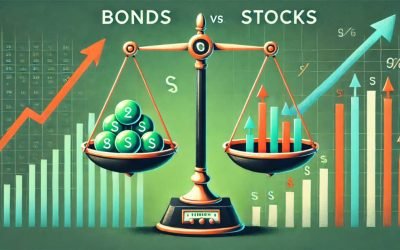Introduction to Retirement Investing
Planning for retirement is a crucial aspect of financial management that requires careful consideration and strategic planning. With the right investment strategies, you can ensure a comfortable and financially secure retirement. This article delves into the best ways to invest for retirement, providing valuable insights and practical advice to help you make informed decisions.
Understanding Retirement Goals
Before diving into specific investment options, it’s essential to understand your retirement goals. These goals will guide your investment strategy and help you determine the best ways to allocate your resources.
Assessing Your Financial Needs
Start by estimating your future financial needs. Consider factors such as:
- Living expenses
- Healthcare costs
- Travel and leisure activities
- Inflation
By having a clear picture of your financial needs, you can set realistic retirement goals and develop a plan to achieve them.
Determining Your Risk Tolerance
Your risk tolerance is a critical factor in choosing the right investment strategy. It depends on your age, financial situation, and personal preferences. Generally, younger investors can afford to take more risks, while older investors may prefer more conservative options.
Watch this video discussing Portfolio for retirement
Investment Options for Retirement
There are various investment options available for retirement, each with its own advantages and disadvantages. Here, we explore some of the most popular choices.
Stocks and Shares
Investing in stocks and shares can offer significant growth potential, but it also comes with higher risks. Stocks represent ownership in a company, and their value can fluctuate based on the company’s performance and market conditions.
Advantages of Stocks
- Potential for high returns
- Diversification opportunities
- Liquidity
Disadvantages of Stocks
- Market volatility
- Risk of loss
- Requires active management
Bonds
Bonds are debt securities issued by governments or corporations. They offer a fixed interest rate and are generally considered safer than stocks.
Advantages of Bonds
- Stable income
- Lower risk compared to stocks
- Diversification
Disadvantages of Bonds
- Lower returns compared to stocks
- Interest rate risk
- Inflation risk
Mutual Funds
Mutual funds pool money from multiple investors to invest in a diversified portfolio of stocks, bonds, or other securities. They are managed by professional fund managers.
Advantages of Mutual Funds
- Diversification
- Professional management
- Accessibility
Disadvantages of Mutual Funds
- Management fees
- Potential for lower returns
- Lack of control over individual investments
Real Estate
Investing in real estate involves purchasing property to generate rental income or capital appreciation. It can be a valuable addition to your retirement portfolio.
Advantages of Real Estate
- Potential for steady income
- Appreciation in property value
- Tangible asset
Disadvantages of Real Estate
- High initial investment
- Maintenance costs
- Illiquidity
Retirement Accounts
Retirement accounts, such as Individual Savings Accounts (ISAs) and Self-Invested Personal Pensions (SIPPs), offer tax advantages and are specifically designed for retirement savings.
Advantages of Retirement Accounts
- Tax benefits
- Long-term growth potential
- Flexibility in investment choices
Disadvantages of Retirement Accounts
- Contribution limits
- Early withdrawal penalties
- Complexity in management
Creating a Diversified Portfolio
Diversification is a key principle in retirement investing. By spreading your investments across different asset classes, you can reduce risk and enhance potential returns.
Asset Allocation
Asset allocation involves dividing your investment portfolio among different asset categories, such as stocks, bonds, and real estate. The right allocation depends on your risk tolerance, time horizon, and financial goals.
Rebalancing Your Portfolio
Regularly rebalancing your portfolio ensures that it remains aligned with your investment strategy. This involves adjusting the proportions of different assets to maintain your desired level of risk and return.
Maximising Tax Efficiency
Tax efficiency is an important consideration in retirement investing. By minimising taxes, you can maximise your investment returns and achieve your retirement goals more effectively.
Utilising Tax-Advantaged Accounts
Take advantage of tax-advantaged accounts, such as ISAs and SIPPs, to reduce your tax liability. These accounts offer tax benefits that can significantly enhance your retirement savings.
Tax-Efficient Investment Strategies
Implement tax-efficient investment strategies, such as:
- Holding investments for the long term to benefit from lower capital gains tax rates
- Investing in tax-efficient funds
- Utilising tax-loss harvesting to offset gains with losses
Seeking Professional Advice
While it’s possible to manage your retirement investments on your own, seeking professional advice can provide valuable insights and help you make more informed decisions.
Financial Advisors
Financial advisors can offer personalised advice based on your unique financial situation and goals. They can help you develop a comprehensive retirement plan and guide you through complex investment decisions.
Robo-Advisors
Robo-advisors are automated investment platforms that use algorithms to manage your portfolio. They offer a cost-effective alternative to traditional financial advisors and can be a good option for those with simpler investment needs.
Monitoring and Adjusting Your Plan
Regularly monitoring and adjusting your retirement plan is essential to ensure that it remains aligned with your goals and market conditions.
Reviewing Your Investments
Periodically review your investments to assess their performance and make any necessary adjustments. This includes evaluating the performance of individual assets and the overall portfolio.
Adjusting for Life Changes
Life changes, such as marriage, divorce, or the birth of a child, can impact your financial situation and retirement goals. Adjust your retirement plan accordingly to reflect these changes.
Conclusion
Investing for retirement requires careful planning, diversification, and regular monitoring. By understanding your financial needs, risk tolerance, and investment options, you can develop a comprehensive retirement plan that ensures a comfortable and financially secure future. Remember to seek professional advice when needed and stay informed about market trends and changes in tax laws.

Q&A Section
Q1: What is the best age to start investing for retirement?
A1: The best age to start investing for retirement is as early as possible. The earlier you start, the more time your investments have to grow, thanks to the power of compounding.
Q2: How much should I save for retirement?
A2: The amount you should save for retirement depends on your financial needs, lifestyle, and retirement goals. A common rule of thumb is to save at least 15% of your income each year.
Q3: What is the difference between a SIPP and an ISA?
A3: A SIPP (Self-Invested Personal Pension) is a type of pension plan that offers tax benefits and flexibility in investment choices. An ISA (Individual Savings Account) is a tax-advantaged account that allows you to save and invest without paying tax on the returns.
Q4: Can I invest in real estate for retirement?
A4: Yes, investing in real estate can be a valuable addition to your retirement portfolio. It offers potential for steady income and appreciation in property value.
Q5: Should I seek professional advice for retirement investing?
A5: Seeking professional advice can provide valuable insights and help you make more informed decisions. Financial advisors can offer personalised advice based on your unique financial situation and goals.
Further reading:
Here are a few excellent articles on the best ways to invest for retirement:
- NerdWallet – Retirement Planning: A 5-Step Guide for 2024
This guide outlines a comprehensive approach to retirement planning, starting with estimating how much you need, choosing the right retirement accounts (like a 401(k) or IRA), and selecting investments. It emphasizes the importance of starting early to maximize compounding growth. It also discusses various types of retirement accounts and how to balance aggressive and conservative investments as you age (NerdWallet: Finance smarter). - Investopedia – Tips for Successful Retirement Investing
This article provides a practical overview of key strategies for retirement investing. It covers how to maintain a balanced portfolio, reduce investment fees, and use tax-advantaged accounts like 401(k)s and IRAs. Additionally, it highlights the importance of adjusting your investment strategy based on age and risk tolerance (Investopedia) (Investopedia). - Kiplinger – Step-by-Step Guide to Retirement Planning by Age
This article breaks down retirement planning into stages based on age, from your 20s through your 60s. It stresses the power of compound interest and encourages taking advantage of employer matches in retirement accounts. It also emphasizes the importance of adjusting risk as you approach retirement to protect your savings (Kiplinger.com).
These articles offer varied perspectives on the best strategies to invest for retirement, from the early accumulation years to late-stage risk management.















 How to trade CFD? (00:49)
How to trade CFD? (00:49) How to trade binary options*? (01:22)
How to trade binary options*? (01:22) Forex. How to start? (01:01)
Forex. How to start? (01:01)